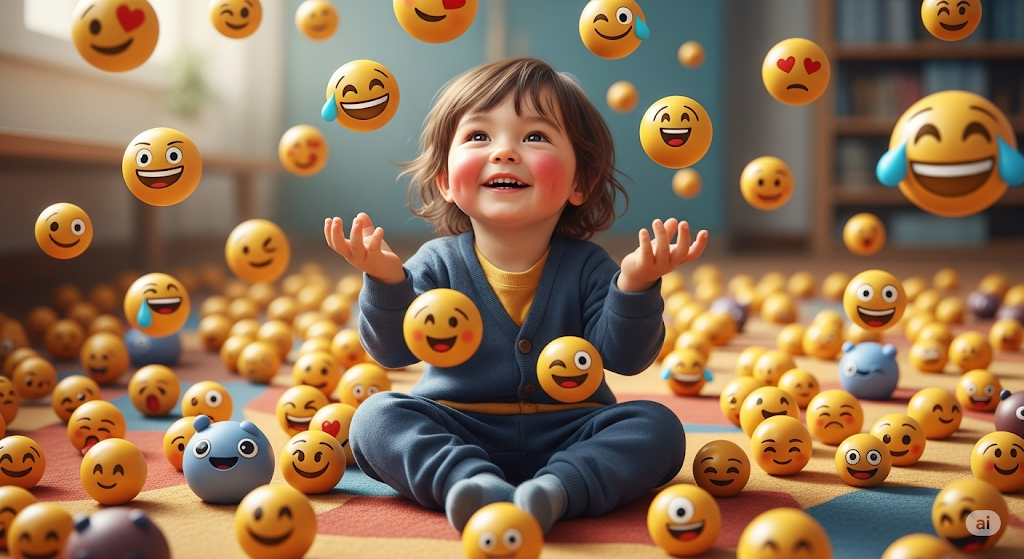The relationship between a child and a teacher in preschool plays a key role in shaping the child’s cognitive, emotional, and social development. Research indicates that the quality of this interaction can influence a child’s readiness to learn, their ability to form relationships, and their level of emotional self-regulation. Emotional support from the teacher encourages exploration of the environment and engagement in the learning process.
In recent years, increasing attention has been paid to research on how relationships with teachers affect the development of preschool children. The results of these studies are clear: children who experience positive, supportive interactions with teachers achieve better outcomes both cognitively and emotionally, as well as socially.
Impact on Cognitive Development

1. Linguistic and Cognitive Stimulation
One of the most important aspects of a preschooler’s development is language development. Children who have frequent conversations with their teacher develop their communication skills more quickly. Studies conducted by Professor Catherine Snow’s team at Harvard University have shown that rich language interactions with adults during preschool years translate into better reading and writing skills in elementary school (Snow, C. E., 2010).
Equally important is encouraging children to ask questions. Preschoolers who feel safe in their relationship with the teacher are more open to exploring the world, more likely to ask about new things, and show greater motivation to learn. Research by Piaget and contemporary developmental psychologists confirms that children learn most effectively when they can actively participate in the cognitive process, with the teacher acting as a guide rather than just a provider of knowledge (Piaget, J., 1972).
An individual approach to each child, adapting teaching methods to their needs and abilities, allows for fuller use of the child’s intellectual potential. Research conducted by the National Institute of Child Health and Human Development (NICHD) has shown that children who receive individual support from teachers achieve higher scores on cognitive tests (NICHD Early Child Care Research Network, 2002).
2. Development of Problem-Solving Skills
Another important element of cognitive development is the ability to think independently and solve problems. A teacher who does not provide ready-made solutions but encourages the child to seek answers independently develops their analytical and logical skills. Research by Carol Dweck from Stanford University shows that children who are encouraged to take on challenges and solve problems on their own develop a “growth mindset,” which promotes educational success (Dweck, C. S., 2006).
The use of activating methods, such as educational games, group work, or thematic projects, allows children to apply acquired knowledge in practice. Studies published in the journal “Early Childhood Research Quarterly” have shown that children participating in active learning activities demonstrate higher levels of problem-solving skills and better adaptation to the school environment (Mashburn, A. J. et al., 2008).
Impact on Emotional Development

1. Emotion Regulation
The emotional development of a preschooler is just as important as intellectual development. Children at this age often experience strong emotions that they are not always able to handle. Emotional support from the teacher is invaluable during this period. Research by Pianta and Stuhlman (2004) has shown that children who have a close, supportive relationship with their teacher cope better with emotion regulation and exhibit fewer behavioral problems.
Modeling behavior by the teacher plays a key role here. Children learn to regulate their emotions by observing adults—seeing how the teacher reacts in stressful situations, resolves conflicts, or supports others, they internalize these patterns and begin to apply them in their own lives. Studies show that teachers who can manage their own emotions and model positive behaviors have a positive impact on children’s emotional development (Jennings, P. A., & Greenberg, M. T., 2009).
2. Building Self-Esteem
Self-esteem is the foundation of healthy emotional development. Children who receive positive reinforcement from the teacher—praise, encouragement, recognition of effort—gain self-confidence and belief in their own abilities. Research by Susan Harter (2012) shows that children who feel accepted and appreciated by teachers have higher self-esteem and are more resilient to stress.
A safe, accepting preschool environment makes children more open to new experiences, more willing to take on challenges, and less afraid of making mistakes. A teacher who notices and appreciates each child’s individual achievements builds a sense of agency and motivates further development.
Impact on Social Development

1. Learning Cooperation and Communication
Preschool is the first place where children learn to function in a peer group. The teacher acts as a guide and mediator, helping children form relationships, resolve conflicts, and learn cooperation. Research by Howes and Hamilton (1992) has shown that children who have positive relationships with teachers cope better in interactions with peers and demonstrate higher levels of social competence.
Through shared play, group projects, or integration activities, children develop communication skills, learn to listen to others, express their own needs, and respect differing opinions. A teacher who actively supports children in building relationships teaches them negotiation, compromise, and constructive conflict resolution.
2. Readiness for School Learning
Positive relationships with the teacher also have a huge impact on a child’s readiness to start school. Research by Ladd, Birch, and Buhs (1999) has shown that children who have good relationships with teachers in preschool adapt more easily to new school conditions, are more independent, and open to new challenges.
Teacher support increases motivation to learn, develops curiosity about the world, and a desire to acquire knowledge. Children who have experienced positive interactions with the teacher cope better with the transition to primary school, more quickly establish relationships with new teachers and peers, and are more resilient to stress associated with changing environments.
Practical Tips for Teachers and Parents
For the child-teacher relationship to fully support the preschooler’s development, it is worth remembering a few key principles:
Building trust – spending time on individual conversations with the child, showing interest in their experiences and needs.
Empathy and patience – responding to the child’s emotions with understanding, avoiding judgment and criticism.
Stimulating curiosity – asking open-ended questions, encouraging independent thinking and problem-solving.
Supporting independence – giving the child opportunities to make decisions, allowing mistakes and learning from them.
Modeling positive behaviors – showing how to deal with difficulties, resolve conflicts, and support others.
Parents also play an important role in building a positive relationship between the child and the teacher. Cooperation with the preschool, open communication with teachers, and supporting the child in everyday educational challenges are key to the child’s harmonious development.
Summary
The quality of the relationship between a child and a teacher in preschool is fundamental to their cognitive, emotional, and social development. A supportive, empathetic approach from the teacher not only increases the child’s readiness to learn but also helps them build self-esteem, develop communication skills, and cope with emotions. Preschool is a place where children learn not only letters and numbers but, above all, how to live in society—and the teacher is a guide, mentor, and role model in this process.
Investing in the quality of the child-teacher relationship is an investment in the future—both of the individual child and of society as a whole. Therefore, it is worth ensuring that every child has the opportunity to develop in an atmosphere of trust, acceptance, and support.

Selected scientific sources:
Snow, C. E. (2010). Academic language and the challenge of reading for learning about science. Science, 328(5977), 450-452.
NICHD Early Child Care Research Network. (2002). The relation of global first-grade classroom environment to structural classroom features and teacher and student behaviors. The Elementary School Journal, 102(5), 367-387.
Dweck, C. S. (2006). Mindset: The New Psychology of Success. Random House.
Pianta, R. C., & Stuhlman, M. W. (2004). Teacher-child relationships and children's success in the first years of school. School Psychology Review, 33(3), 444-458.
Jennings, P. A., & Greenberg, M. T. (2009). The prosocial classroom: Teacher social and emotional competence in relation to student and classroom outcomes. Review of Educational Research, 79(1), 491-525.
Harter, S. (2012). The construction of the self: Developmental and sociocultural foundations. Guilford Press.
Howes, C., & Hamilton, C. E. (1992). Children's relationships with child care teachers: Stability and concordance with parental attachments. Child Development, 63(4), 867-878.
Ladd, G. W., Birch, S. H., & Buhs, E. S. (1999). Children's social and scholastic lives in kindergarten: Related spheres of influence? Child Development, 70(6), 1373-1400.
Mashburn, A. J., et al. (2008). Measures of classroom quality in prekindergarten and children's development of academic, language, and social skills. Child Development, 79(3), 732-749.

